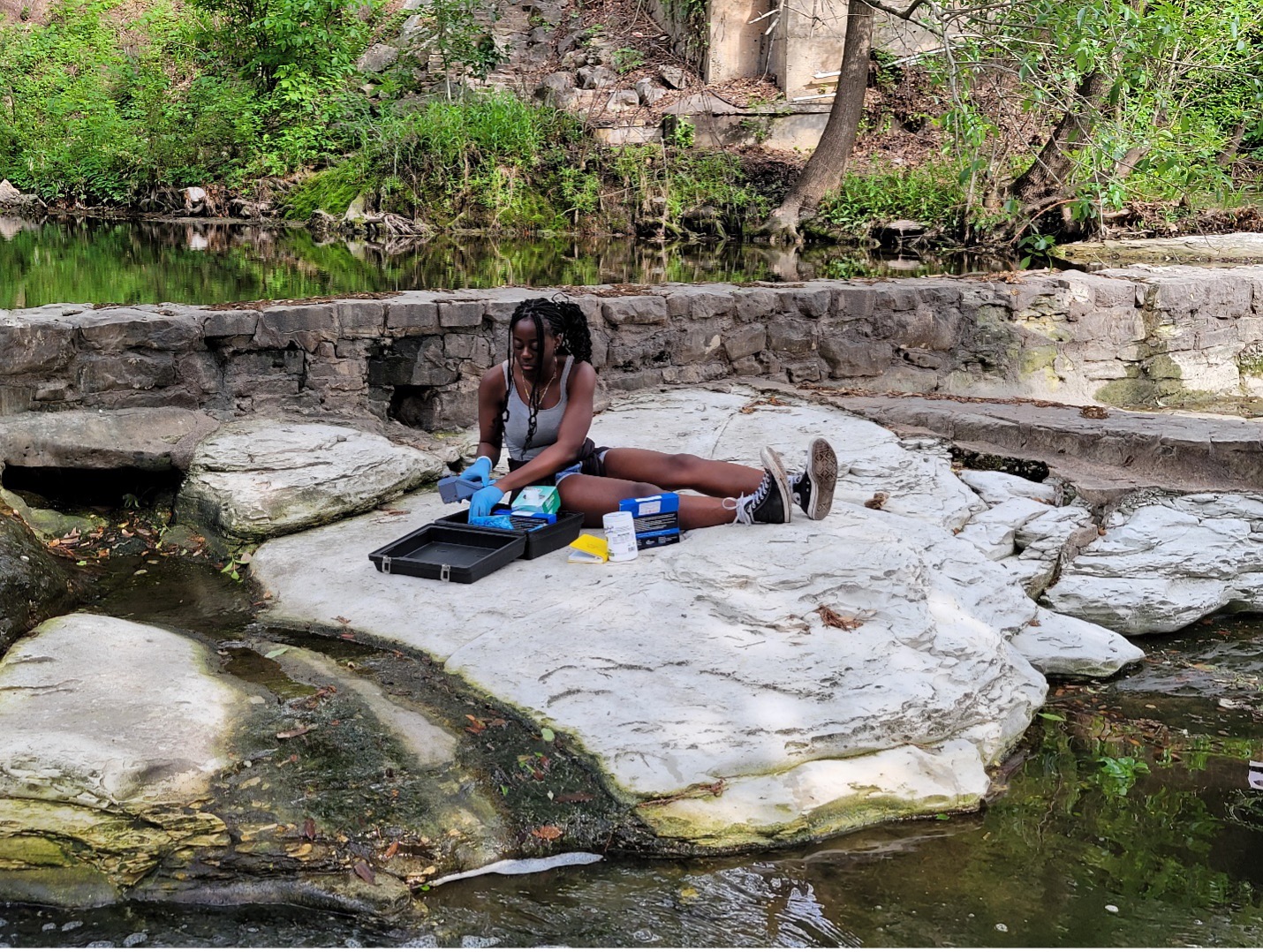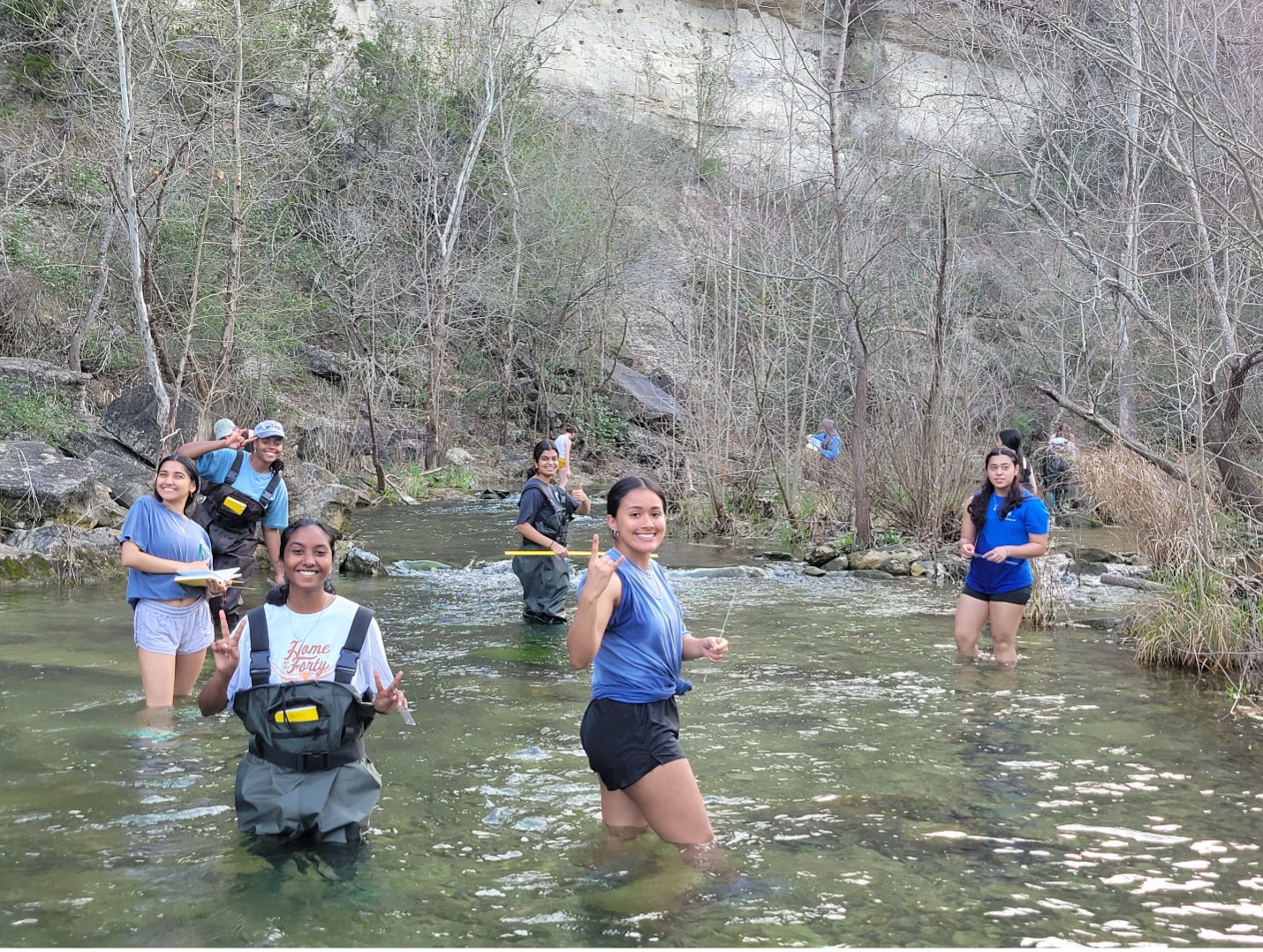
B.S. in Environmental Science
The Environmental Science (EVS) major is an interdisciplinary degree, integrating the principles of biology, geography, and geology to give students a wholistic, broad perspective of some of the world’s most pressing environmental and sustainability issues. With a focus on the geosciences, students can dive deeper into fields such as climate research, hydrology, and atmospheric science.
Why environmental science?
Environmental science is a broad field that examines the facets of Earth most vital to life. Students have the opportunity to explore the Earth and its environment with a foundational understanding of its mechanisms, and have the tools and critical thinking skills to solve a wide scope of issues, from pollution to the energy transition to conservation.
What do environmental scientists do?
Environmental scientists examine problems at the intersection of geoscience, biology, and geography. Utilizing scientific knowledge and their own curiosity about how the world works, environmental scientists may conduct air quality monitoring, ground water modeling, endangered species surveys, environmental justice advocacy, applied geographic information systems work, or other Earth science-focused work.

Career and graduate school opportunities
Equipped with a degree in Environmental Sciences with a Geoscience focus, graduates will be prepared to work across the private, public, and nonprofit sectors, often connecting policy and science. They will also be ready to continue their studies at the graduate level, diving deeper into the subjects of their choosing.
Graduate school disciplines students will be ready for
- Environmental science
- Environmental risk
- Ecology
- Hydrogeology
- Geology
- Climate change
- Carbon cycle and energy transition
Industries hiring environmental scientists
- Energy transition
- Environmental consulting
- Government agencies
- Environmental law
- Aerosol monitoring
- Corporate sustainability
- Policy
Wage data for related jobs with a bachelor’s degree
$76,480
Environmental Scientists
$64,420
Conservation Scientists and Foresters
$85,990
Hydrologists
$87,480
Geoscientists
Median annual wage data courtesy of the Bureau of Labor Statistics
Research opportunities
Environmental science majors are required to complete a capstone research project for their degree, entailing two semesters of independent, original research. Environmental Science Geoscience students have explored topics such as groundwater sustainability issues, real estate development in the Texas Hill Country, environmental engineering to mitigate pollutants, and urban stream health. This major gets students out into the field early, and has multiple research experiences built into the program.
All Jackson School undergraduates have an abundance of research opportunities at their fingertips. Explore more on our Undergraduate Research page.
Degree requirements
The EVS-Geosciences degree requires students to take an interdisciplinary array of courses, plus a more focused selection of geoscience courses. With this foundation, students who complete this program will be able to assess environmental issues critically from multiple perspectives; to perform field, laboratory, and computer analyses; and to conduct original research.
Geoscience courses
All EVS-Geoscience majors need to fulfil the following coursework for their concentration. These courses will equip them with a geoscientific understanding of climate, water, and sustainability issues.
Geoscience fundamentals
Take each of the following courses.
- GEO 405: Life through Time or GEO 416S: Earth and Planetary Processes through Time
- GEO 416K: Earth Materials
- M 408D: Sequences, Series, and Multivariable Calculus or M 408M: Multivariable Calculus
Climate and water
Choose one of the following courses.
- GEO 347D: Global Warming
- GEO 347G: Climate System Modeling
- GEO 376E: Environmental Isotope Geochemistry
- GEO 476K: Groundwater Hydrology
- GEO 476M: Aqueous Geochemistry
- GEO 376S: Physical Hydrology
- GEO 377P: Physical Climatology
- GEO 371T: Any topic, with prior approval of faculty advisor
Field course
Choose one of the following courses.
- GEO 348K: Marine Geology and Geophysics Field Course
- GEO 376L: Field Methods in Groundwater Hydrology
- GEO 660A: Interpretation of Sedimentary and Volcanic Environments in the American West and GEO 660B: Interpretation of Structures, Basins, and Landforms in the Rocky Mountains
Electives
Take nine additional credit hours of any upper division geological science courses that are not already required in the environmental science degree. Explore all upper division GEO courses in the university’s course catalog.
Environmental science courses
All Environmental Science majors need to fulfil the following coursework requirements. These courses will give students a scientific perspective on environmental and sustainability issues, analysis, and management.
Introductory course
Take the following course.
- EVS 301
Field experience and research methods
Take the following course.
- EVS 311: Field Seminar in Sustainability
Environment and sustainability
Choose one course.
- BGS 325: Social and Ethical Responsibility of Business
- BGS 372: Strategic Corporate Social Responsibility
- FIN 372: Environmental, Social, and Governance Investing
- GRG 309C: Creating the Sustainable Society
- GRG 320J: Environmental Justice
- GRG 342C: Sustainable Development
- GRG 342N: Sustainable Landscapes and Seascapes
- GRG 344G: Environmental Law
Geographic information systems
Choose one course.
- GRG 460G: Environmental Geographic Information Systems
- GRG 462K: Introduction to Remote Sensing of the Environment
- GEO 327G: Geographic Information System and Global Positioning System Applications in Earth Sciences
- GEO 455S: Introduction to Remote Sensing for Geoscientists
Earth systems
Take the following course.
- GEO 416W: Climate, Water, and the Environment
Choose one course.
- GRG 330W: Water and Watersheds
- GRG 301K: Weather and Climate
- GEO 347D: Global Warming
- GEO 370E: Ecohydrology and Biometeorology
- GEO 476K: Groundwater Hydrology
- GEO 476M: Aqueous Geochemistry
- GEO 376S: Physical Hydrology
- GEO 377P: Physical Climatology
Computational science
Choose two courses.
- GRG 462K: Introduction to Remote Sensing of the Environment
- GRG 464K: Advanced Remote Sensing and Pattern Analysis
- GRG 368C: Spatial Analysis and Geographic Information Systems
- GRG 369D: GIS Applications in Social and Environmental Science
- GRG 470C: Advanced Geographic Information Systems
- GRG 370D: Spatial Reasoning with Geographic Information Systems
- GEO 325G: Computational Applications in the Geosciences
- GEO 352P: Python for Geoscience Research
- GEO 455S: Introduction to Remote Sensing for Geoscientists
- PGE 338: Geostatistics and Data Analysis
- SDS 320E: Elements of Statistics
- SDS 320H: Elements of Statistics: Honors
- SDS 321: Introduction to Probability and Statistics
Multidisciplinary courses
Geological sciences
Choose one of the following courses.
- GEO 401: Physical Geology
- GEO 303: Introduction to Geology
Geography
Take the following course.
- GRG 412E: Digital Earth
Ecology
Choose one of the following groups of courses.
- BIO 373: Ecology and BIO 373L: Ecology Laboratory
- MNS 320: Marine Ecology and MNS 120L: Laboratory Studies in Marine Ecology
Capstone research experience
Choose from one of the following pairs.
- EVS 271: Research Experience and EVS 371: Research Experience
- EVS 271: Research Experience or MNS 370: Special Studies in Marine Science; and one of the following courses: CH 320M: Organic Chemistry I, GRG 460G: Environmental Geographic Information Systems, GRG 462K: Introduction to Remote Sensing of the Environment, GRG 368C: Spatial Analysis and Geographic Information Systems, GEO 327G: Geographic Information System and Global Positioning System Applications in Earth Sciences, M 408D: Sequences, Series, and Multivariable Calculus, M 408M: Multivariable Calculus, SDS 320E: Elements of Statistics , SDS 320H: Elements of Statistics: Honors, or SDS 321: Introduction to Probability and Statistics
Building block requirements
These courses take place outside of the Jackson School and are required of all environmental science students. This major requires a robust understanding of mathematics, physics, biology, and chemistry to prepare students for advanced classes specific to the degree.
Mathematics
Take each of the classes listed for either Option 1 or Option 2.
Option 1:
- M 408C: Differential and Integral Calculus
- M 40N: Differential Calculus for Science
- M 408S: Integral Calculus for Science
Option 2:
- M 408L: Integral Calculus
- M 408K: Differential Calculus
Physics
Take each of the classes listed for Option 1, Option 2, or Option 3.
Option 1:
- PHY 301: Mechanics
- PHY 101L: Laboratory for Physics 301
Option 2:
- PHY 317K: General Physics I
- PHY 117M: Laboratory for Physics 317K
Option 3:
- PHY 303K: Engineering Physics
- PHY 103M: Laboratory for Physics 303K
Chemistry
Take at least two courses.
- CH 301: Principles of Chemistry I or 301H
- CH 302: Principles of Chemistry II or 302H
Biological sciences
Take each of the classes listed for Option 1 or Option 2.
Option 1:
- BIO 311C: Introductory Biology I
- BIO 311D: Introductory Biology II
Option 2:
- BIO 315H: Advanced Introduction to Genetics: Honors
Read more about these courses in the University of Texas course catalog.
The 2024-2026 environmental science degree plan is available on the University Catalogs website.
Past degree plans: 2022-2024 | 2020-2022 | 2018-2020 |2016-2018 | 2014-2016
Next steps: Applying and transferring
Ready to start changing the world? If you’re a high school student interested in applying to the Jackson School to be an environmental science major, please select Geological Sciences during the process of your undergraduate application to The University of Texas at Austin. Additional application information can be found on the UT Office of Admissions website and the Jackson School’s Admissions page.
Thinking of transferring to the Jackson School to be an environmental science major? If you’re an undergraduate student already enrolled at The University of Texas at Austin, you may enter the Jackson School through an internal transfer process which occurs once a year. Please visit the Jackson School’s Internal Transfers webpage for details about the internal transfer process, deadlines, and upcoming information session dates to learn more about our school and programs. We also encourage you to contact academic advising before you start this process.